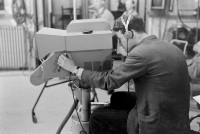SCREEN PLAYS
Iphigenia at Aulis
Classics on TV: BFI Southbank programme, 26 June 2012
Tonight sees the fifth – and final – programme in the five-night Screen Plays season Classics on TV: Greek Tragedy on the Small Screen at BFI Southbank. This evening we will see Iphigenia at Aulis, Don Taylor’s production of Euripides’ play for BBC Television in 1990. This happens to be the last full production of … Continue reading
‘Greek Tragedy on the Small Screen’: University of Westminster symposium
On Friday afternoon around thirty people, including a number of friends and colleagues, gathered at the University of Westminster in Regent Street for the Screen Plays symposium about Greek tragedy on British television. Dr Amanda Wrigley brought together five experts on the subject for discussions to complement the hugely successful BFI Southbank season. Following are notes from my own enjoyment of the event but, if you were present on Friday, we would love to hear your thoughts and responses. Continue reading
The Angry Gods, comprising Iphigenia at Aulis, Oresteia and The Winter’s Tale (A-R for ITV Schools, 1961)
I’ve been slowly working up my second case study for Screen Plays which concerns stage plays produced on television in educational contexts. Recently I’ve been continuing my research into The Open University’s A307 Drama distance-learning course which was transmitted on television each year for five years from 1977: there were sixteen productions in all; I’ve … Continue reading
Greek plays: Iphigenia at Aulis (BBC, 1990)
Following on from my recent posts on Don Taylor’s 1986 The Theban Plays trilogy for the BBC, I turn my focus to his very last work for television in 1990, which was another Greek tragedy – Euripides’ Iphigenia at Aulis – and which, as it happens, appears to be the last full production of Greek drama on British television. In this post I draw on Taylor’s aim to achieve what we may call ‘mass media theatre’, through techniques such as multi-camera continuous shooting, to analyse the intentions that lay behind his productions and to ascertain whether he was successful within the parameters he set himself. I would also like to offer some thoughts about the ways in which this production made good use of televisual devices to create effects which would simply not be possible in the theatre. This post concludes my chronological journey through the best documented productions in my Greeks on Screen case study. (Good timing, too, Screen Plays will shortly announce the ‘Classics on TV: Greek Tragedy on the Small Screen’ season of screenings at BFI Southbank in June 2012, together with an associated symposium at the University of Westminster on 22 June … save the date and watch this space!) Continue reading
